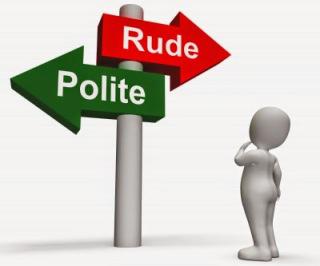We have forgotten much of what made being with other people pleasant. Some of it is due to our servitude to the ever present screens that define our lives today. My wife and I watch others as we go out to eat and it is amazing how many tables have people whose focus is not on the food or each other but on their screens. If they do look up to speak, it is most likely a reference to what the screen just displayed before them. How sad it is that we have allowed those screens to steal away the very rules of polite company that once marked our progress!
It is not simply the screen that is the problem. We no longer pay much attention to anything formal. We wear what feels good to us and not what makes us look good. I remember a meme that contrasted Cary Grant in a fedora, overcoat, and suit with a guy in a manbun, way too short shorts, and the equivalent of a masculine tube top. Underneath was the statement, "They call this evolution?" Manners are not quite popular but they are more valuable than we would think.
I wish that we were more, well, “polite.” Polite means being mannerly. The polite person is someone who knows and uses manners in dealing with others. Of course, it assumes the basic kindness of saying please and thank you but that is not simply it. Linguistically, the origin of the word has more to do with polish than with rules to govern life. Think of it as the final polish that makes a pair of shoes shine and the polite person as one who has gone the extra mile to shine in their conversation and relations with individuals or a group. The Latin roots of the word polite are in politus, the past participle of polire, which means to smooth or polish. All the way through Middle English and well into the 1700s, the word referenced something that had been buffed up -- like a silver tea pot. Like every word, it also developed another meaning, parallel to its first but extending the shine to something larger. A polite person was refined or elegant or cultured or cultivated or courteous or respectful.
Your shoes might be polite as might be your silver service. But we don't polish shoes much anymore nor do we set out a silver tea pot. Apparently, neither do we foster or recognize manners and social skills as all that important. Better in our age to be true to self even if that means being a rude lump to the rest of us. It is even common to ridicule or resent what were once the markers of manners and the expectation of polite society -- holding a door for a lady or tipping the hat or shaking hands. But are we a better society for giving up the polish? Have we raised the level of conversation and behavior at the same time we have cast aside the books on etiquette and the learning of manners?
Soon we will find ourselves packed around tables and feasting upon the Christmas goose with people we may not get along with all that well. I wish for us manners. Learn to be polite. Shut up. You do not have to say what is on your mind or your heart. There is no obligation to say out loud what you are thinking. In fact, before you open your mouth to drop a bomb, think twice about it, even three times, and ask yourself if this is the polite thing to do. Are you showing your polished side or the tarnished side of your personality. I, for one, am not amused by our penchant to be honest when it is merely a ruse to being cruel. There may not be many on my side but I long for the days when we know more for our politeness and manners than for our bluntness and honesty. If we could learn that from a screen, I might even allow us to pay attention to those pesky things while in company with others. We have become a self-indulgent, rude, and ignorant lot in our social relations and it is not helping with anything.

Isn’t the same Latin root where we get the rudest form of interrelations: politics?
ReplyDelete